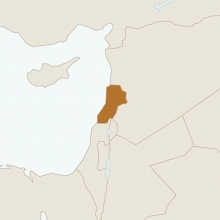Although Lebanon’s new cabinet met for the first time on Wednesday, the country’s tenacious protest movement hasn’t seemed to lose momentum. As the country’s security forces are now accused of using excessive violence against demonstrators, including the misuse of tear gas and rubber bullets, FRANCE 24 (above) took an inside look at their increasingly tough tactics.
Lebanon’s new administration has already been dubbed a ‘Halloween’ government because the extent to which it draws the country closer to Iran is spooky, George Washington University adjunct professor Firas Maksad writes for Foreign Policy. @FirasMaksad
 Influential members of the European Parliament said Wednesday that they would support a U.S. effort to persuade the EU to ban Hezbollah (right) as a terrorist group, a day after the organization solidified a major role in Lebanon’s newly formed government, Politico adds (HT:FDD).
Influential members of the European Parliament said Wednesday that they would support a U.S. effort to persuade the EU to ban Hezbollah (right) as a terrorist group, a day after the organization solidified a major role in Lebanon’s newly formed government, Politico adds (HT:FDD).
A full shift to proportional representation would go a long way toward opening up the system to the broad-based, non-confessional protest movement seeking to change the sectarian foundations of the political system, says Osama Gharizi, a senior program advisor at the United States Institute of Peace and a non-resident fellow at the Global Public Policy Institute. Indeed, had such an electoral framework already been in place, non-traditional political parties and individuals would already be participating in the system in consequential numbers, he writes for War on the Rocks:

NDI
In 2016, Beirut Madiniti — a movement comprised of academics, practitioners, and activists —contested the Beirut municipal elections on a platform focused on governance issues. … Beirut Madiniti did not gain a single seat in the 24-seat municipal council due to the majoritarian election system. This outcome would have surely been different under proportional rules, even if municipal council elections differ somewhat from parliamentary elections in that seats are not allocated along sectarian lines.
A shift to a genuine, proportional representation system is the most feasible way for the mass demonstration movement to change Lebanon’s political system, Gharizi adds, noting that the constitution already contains provisions at the heart of the protest movement’s demands for deconfessionalization and more effective governance.







